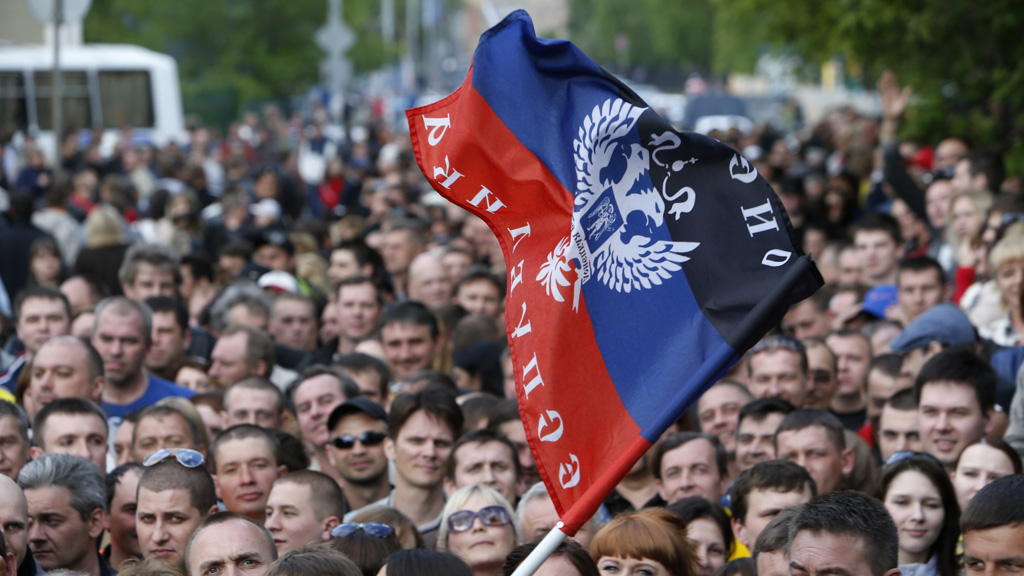Ukraine: eastern rebels claim victory in referendum
Russia calls on Ukraine’s interim government to hold a nationwide debate after separtists in two eastern regions of the country claimed victory in referendums on self-rule.

In a statement, the Russian Foreign Ministry said “the Kiev authorities continue to display a criminal lack of readiness for dialogue with their own people” and urged the government to hold meetings with representatives of eastern and southern regions.
The statement follows the weekend referendums, which Kiev has called illegitimate.
Organisers in the main region of Donetsk, holding the makeshift vote on Sunday, said nearly 90 per cent had voted in favour.
Well before polls closed, one separatist leader said the region would form its own state bodies and military after the referendum, formalising a split that began with the armed takeover of state buildings in a dozen eastern towns last month.
‘Soaked in blood’
Another said the vote simply showed that the east wanted to decide its own fate, whether in Ukraine, on its own, or as part of Russia.
“Eighty-nine percent, that’s it,” the head of the separatist electoral commission in Donetsk, Roman Lyagin, said.
Ukraine’s interior ministry called the referendum a criminal farce, its ballot papers “soaked in blood”. One official said two-thirds of the territory had not participated.
Bit the see- thru ballot box bears the People’s Republic of Donetsk flag and the vote is about whether it shd exist! pic.twitter.com/7gcvteWuEg
— alex thomson (@alextomo) May 11, 2014
Sunday’s vote went ahead despite a call by Russian President Vladimir Putin to postpone it – a move that briefly raised hopes for an easing of tension.
A festive atmosphere at makeshift polling stations in some areas belied the potentially grave implications of the event. In others, clashes broke out between separatists and troops over ballot papers and control of a television tower.
‘Falsified ballot papers’
Zhenya Denyesh, a 20-year-old student voting early at a university building in the rebel stronghold of Slaviansk, said: “We all want to live in our own country”. But asked what he thought would follow, he replied: “It will still be war.”
In the south-eastern port of Mariupol, scene of fierce fighting last week, there were only eight polling centres for a population of half a million.
Queues grew to hundreds of yards in bright sunshine, with spirits high as one centre overflowed and ballot boxes were brought onto the street.
On the eastern outskirts, a little over an hour after polls opened, soldiers from Kiev seized what they said were falsified ballot papers, marked with yes votes, and detained two men.
They refused to hand the men over to policemen who came to take them away, saying they did not trust them. Instead, they waited for state security officers to interview and arrest them.
On the edge of Slaviansk, fighting broke out around a television tower shortly before people began making their way through barricades of felled trees, tyres and machinery for a vote the west says is being orchestrated by Moscow. The Ukrainian defence ministry said one serviceman was wounded.
Ballot papers in the referendum in the regions of Donetsk and the much smaller Luhansk, were printed without security provision, voter registration was patchy and there was confusion over what the vote was for. Separatists in Luhansk said only 5 per cent had voted against.
More fighting
A man was later reported killed in a clash in the eastern town of Krasnoarmeisk, Interfax-Ukraine news agency said, adding to a toll so far in the dozens but creeping higher by the day.
Two civilian were also killed as the National Guard started shooting at protesters and voters, who had gathered around a seized polling station in Krasnoarmeisk, according to Russia Today.
The National Guard entered the city in the Donetsk region earlier on Sunday and occupied several polling stations, the city council building among them. First reports on shooting appeared on Twitter.
“I just saw the National Guard kill one and injure several others,” Russian journalist Ilya Azar told Russia Today.